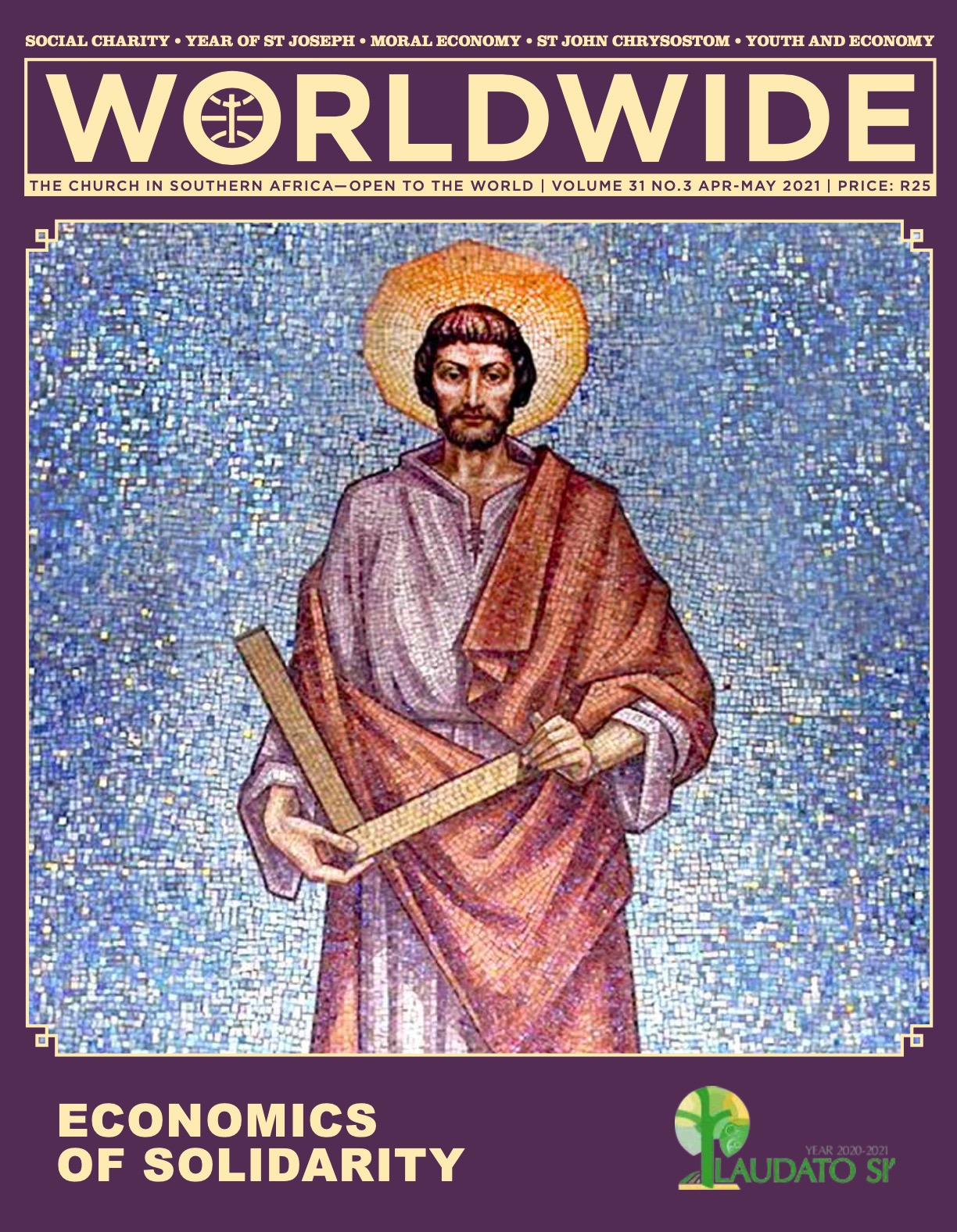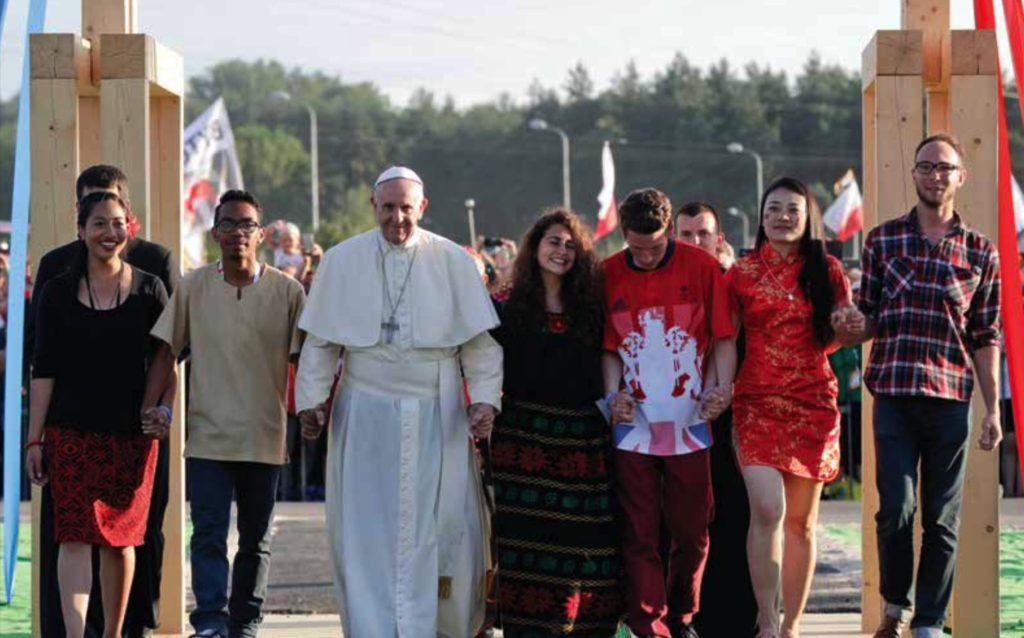
St Joseph and The Dignity of Human Work
We are celebrating the Year of St Joseph. He is, for us Christians, an example of honesty and fidelity, a model of the father figure in the family. He is the humble and firm man who sustained the Holy Family through very difficult situations. This mosaic, portraying him as a carpenter, reminds us of the dignity of human labour. Through work, we become collaborators in the building of society, contributing to it with our various talents. Job creation and sharing of opportunities need to become part and parcel of a new economics of solidarity. Social charity, sustainability and respect for the environment will be integral elements of that model that aims at respecting the dignity of every person.
YOUTH VOICES • ECONOMY OF FRANCESCO

Stewardship and A Shared Future
BY JILL A. WILLIAMS | MASTERS IN LANDSCAPE ARCHITECTURE, PRETORIA
RICH NATIONS are, allegedly, hoarding COVID 19 vaccines. Ten countries are said to have administered 75% of the available vaccines, while 130 countries have not administered a single one as of 18 February of this year (Linnane 2021). This is just one example of many, where people or nations with power have ensured that their own are benefitted beyond measure, while those who are not as well off, scramble for crumbs. Resource allocation always comes down to those who hold the power. Who then, would be willing to share their resources with the powerless? What is the blockage that hinders the flow of generosity when it comes to resource-sharing?
We want to live in a world where we share and cherish resources, as opposed to destroying, damaging or hoarding them. This is the gist of two out of thirteen requests made by the “…young economists, entrepreneurs and economists of the world…” in line with The Economy of Francesco (2020). This is a call to the global powers-that-be to change the way they operate global banking and financial systems (which affect every part of daily living) before we compromise our future to no return. Philanthropic models and the Third sector, which includes NGOs and NPOs, are acknowledged by Pope Francis in Fratelli Tutti (FT) as needed structures within society but are also seen to be mostly ineffective in addressing the injustices that the poorest of the poor experience daily. One example of this is the injustice of limited access to nutritious food and clean water that were, in most cases, once readily available as ecosystem services from the environment, for countries ravaged by starvation. We need food aid, soup kitchens and food drives, especially since many jobs were lost during the global pandemic. This must, however, be accompanied by the empowerment of those affected by the issue, so that they can sustainably generate, for example, their own food and drinking water. This is often a labour and time-intensive affair, which most organisations do not have the capacity to offer.
Facing the reality
“The sight of a person who is suffering disturbs us…since we have no time to waste on other people’s problems” (FT 17). Time is a resource that most would not be willing to share or go to waste. In fact, it could be seen as one of the most valued resources in the corporate world. The more time that is invested in the right asset, the greater the rewards that will be reaped. This points to another valuable insight from Fratelli Tutti: that existence is not an isolated occurrence, but that it is a “time for interactions” (FT 17, 18). It is possible that people avoid these uncomfortable interactions because they do not want to face the reality of their own poverty, sickness or suffering in their hearts or minds.
“If we are troubled by the extinction of certain species, we should be all the more troubled that in some parts of our world, individuals or peoples are prevented from developing their potential and beauty by poverty or other structural limitations. In the end, this will impoverish us all” (FT 34).
Oftentimes, it is in the places with the least resources and the poorest conditions that creativity is given room to grow. It is ironic that the rush for more resources to create better products can be outdone by the slowness of creating something impactful from nothing. I am reminded of water-harvesting projects that operate by collecting water from fog, mist and from the water vapour present in the air. One such pilot project is found on Table Mountain, in Cape Town, which is hoped to yield about 4.6 litres of water per square meter, based on other similar projects found along South Africa’s arid West Coast (Daniel 2020). Such projects are not broadcasted on the daily news or seen by governments as worth investing in, to alleviate some of the pressure on water infrastructure faced globally. Perhaps it is beneficial for those with power and authority, for projects like these to remain pilot projects and never reach broader audiences. What is power, when all are given a share of the pie?
The share of resources
What does it look like when resources are shared? The early Church can be seen as a precedent for the spirit in which this should happen:
“All the believers were one in heart and mind. No one claimed that any of their possessions was their own, but they shared everything they had. With great power the apostles continued to testify to the resurrection of the Lord Jesus. And God’s grace was so powerfully at work in them all, that there were no needy persons among them. For from time to time those who owned land or houses sold them, brought the money from the sales and put it at the apostles’ feet, and it was distributed to anyone who had need” (Acts 4: 32–35).
This view on ownership of resources is shared by many indigenous people in the world, such as the San. People are seen as stewards of the land, not owners; the resources that are available do not belong to anyone. Is this oneness and fraternity possible in a world that strives for this same unity, but longs for autonomy and continually rejects the implications of a resurrected Jesus? Jesus resurrected means real joy is possible and available to humanity: of salvation, freedom from sin’s grip and hell’s destruction. That is what releases one’s hold on tangible resources. The narrowed view that everything of value should be gathered up in the store-house, prevents people from experiencing the joy of generous living, which ultimately hinders the blessing which follows that generosity: supernatural favour from God, who is the real owner and creator of all things.
It is therefore possible, through the energy provided by perfect joy, to become one in heart and in mind, as the early Church was. I believe that, apart from the youth being the future leaders of our world, this is the reason that the Pope placed the task of re-thinking the way economics works, in the hands of the youth. A new economy of dignity and humanity can be possible, because of the joy, hope and fraternal love that is part of being young. It is therefore vital for young people to be involved in decision-making processes within leadership structures at all scales of society.
Young people, let us become the hands that are willing to share and reach out to the needy. If we let go of the pursuit for more in the physical, we will be blessed with more of God. Generosity can be cultivated from our generation that can be learnt from in the next generation. We cannot continue individualistic living, when there is a world that needs to see the beauty of an all-encompassing God, who created all things in the unity of the Holy Trinity, and who made us in that very image.
| Dates To Remember |
|
April 1 – Holy Thursday; 2 – Good Friday; World Autism Awareness Day; 3 – Holy Saturday/Easter Vigil; 4 – Easter Sunday; International Day for Mine Awareness and Assistance in Mine Action; 6 – International Day of Sport for Development and Peace; 7 – International Day of Reflection on the 1994 Genocide in Rwanda; World Health Day; 11 – Divine Mercy Sunday; 21 – World Creativity and Innovation Day; 22 – International Mother Earth Day; 25 – World Malaria Day; 28 – World Day for Safety and Health at Work; 30 – Our Lady, Mother of Africa May 1 – St Joseph the worker; Workers Day; 3 – World Press Freedom Day; 8 – Remembrance and Reconciliation for the Victims of the Second World War; 15 – International Day of Families; 16 – Ascension of the Lord; World Communications Day; 20 – World Bee Day; 22 – International Day for Biological Diversity; 23 – Pentecost Sunday; 24 – Closure of Special Laudato Si’ Anniversary Year; 29 – International Day of UN Peacekeepers; 30 – World No-Tobacco Day |
